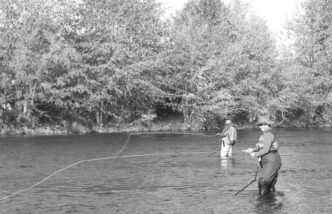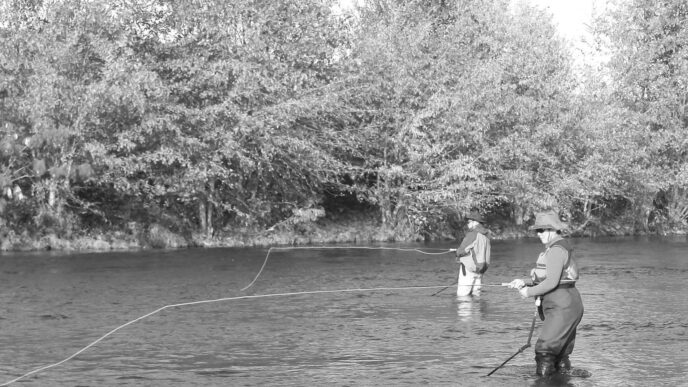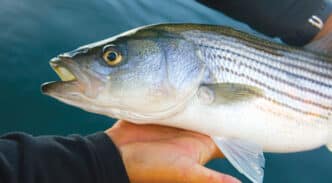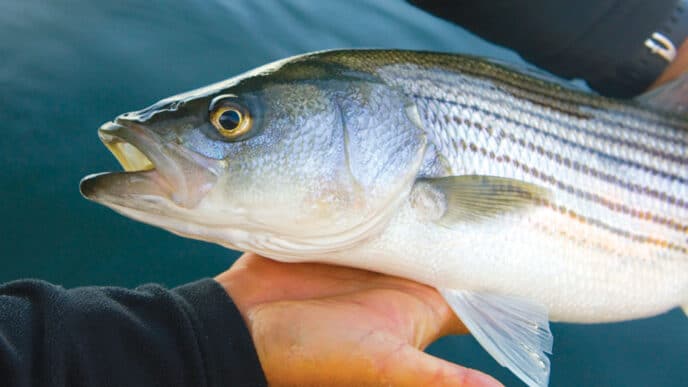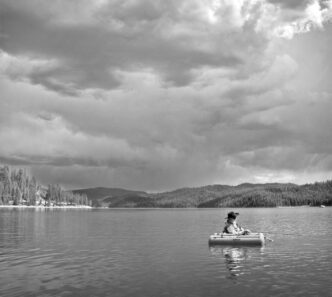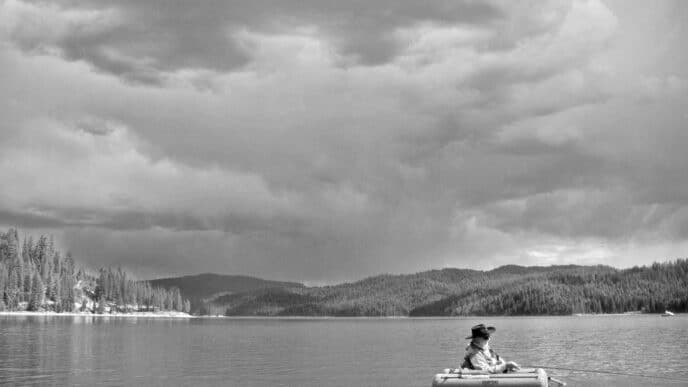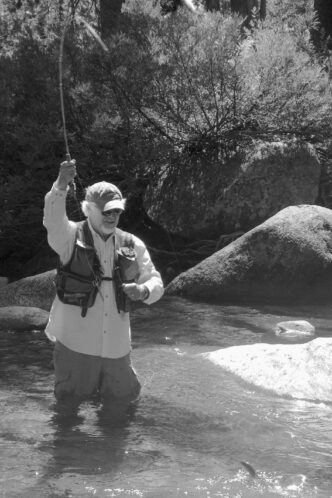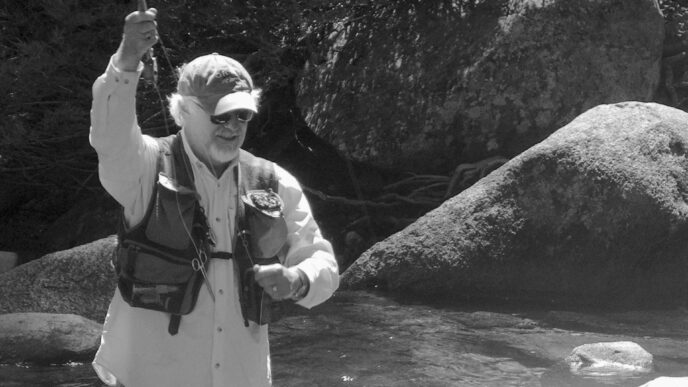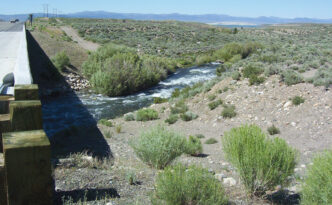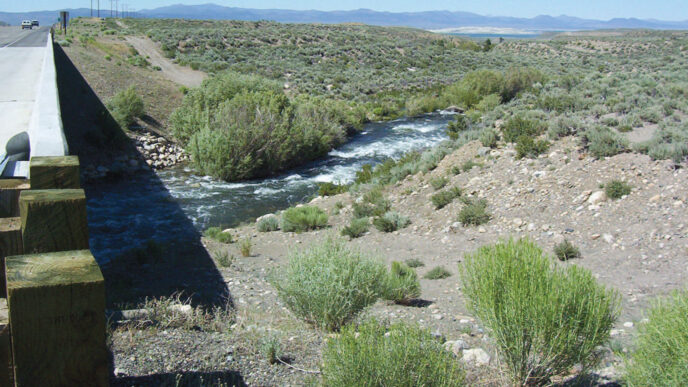As they say, it’s not just about the fishing — it’s about the total experience. For me, a big part of the total experience is eating quality meals while camping on the stream. In my early days, food was the last thing I thought of when camping out on fishing trips. I lived on hot dogs, beans, and beef jerky. Well that got old quick. And hey, don’t get me wrong — it’s not that I don’t like hot dogs. But how about replacing the hot dogs with hand-made Bavarian sausages? I’m lucky to live not too far from a market where I can find these, and more.
It’s not really any harder to cook something that is more appealing to the palate than ordinary camp fare. It’s just as easy to cook a filet mignon or salmon steak as it is a wiener from a package. Good meals require some planning and may require some prep work, but most of that can be done at home before your trip.
They also require the proper tools. Making sure I have everything I need to enjoy great meals while camping is right up there with checking my leaders, tippet, and fly inventory before every trip. I don’t really want to go to the store, if I can avoid it. This means more time on the water.
There are certain items that I need on every trip, no matter what is to be prepared. I put all of these in a large plastic tub and keep it with my camping gear so I won’t forget them. Forgetting stuff can compromise fishing trips, to say the least. Like the time I forgot my wading boots, or the time I left my rod on top of the car. Twice. Let’s not go there.
Camp cooking is all about being organized. Here’s what my portable kitchen contains:
Collapsible water container(s)
Wooden stick matches (large box)
Plastic outdoor tablecloth
Aluminum foil
Biodegradable soap
Hot pads
Scrubbing pads
Plates, bowls, cups, utensils (bring extra plates for serving or prep)
Coffee pot and filters (I like drip — keep it simple)
Paper towels Cloth towel
Barbecue tools (long-handled spatula, tongs, fork, and brush)
Sharp kitchen knife
First-aid kit (given the presence of knives and flames, you have to be prepared for accidents)
Wooden cooking spoons
Can/bottle opener
Corkscrew (I got caught without this once — it wasn’t pretty)
1 medium saucepan with lid 1 large pot with lid
Large cast-iron skillet (with lid, if possible)
Zip-lock bags in various sizes, rubber bands, and ties
Garbage bags
Salt, pepper, bay leaves, basil, and oregano
Olive oil
Sugar
Measuring cup/spoons
Cutting board
Wooden skewers
In addition to the portable kitchen, there are staple food items that I always bring: garlic, onions, potatoes, fruit, rice, pasta, nuts, oatmeal, cereal, bread (or bagels), coffee, wine, crackers, and a stick of salami. These items will last a while and won’t take up much room in the cooler, leaving space for more important things — like beer. In the cooler, I also always bring milk (screw-top cap), eggs, V-8 or orange juice, butter (in a tub or zip-lock bag), some good cheese, and mustard and mayo. With this setup, you can do quite a lot at the campsite or cabin.
All that is left is what you want to eat. Just fill a one-gallon zip-lock with some lettuce and fresh vegetables of your choice. Then in separate zip-locks bring some entrée items, such as chicken, fish, or steak. If I am going to be camping for more than a couple of days, I bring most meats frozen and eat whichever thaws out first — usually the fish.
Many campsites provide barbecues and/or fire rings with grills, but sometimes they are lacking or are inoperable. I like something I can depend on, so I bring my own “Smokey Joe” Weber barbecue grill, a brass brush, and a full large bag of charcoal and/or mesquite. I learned the hard way to get rid of all the ashes and keep the grill in a large garbage bag when traveling.
I also bring a two-burner stove and a single-burner stove. I have a large cooler and use block ice. Block ice is far more efficient and will last for several days.
I tend to concentrate my cooking efforts on dinners only. Most breakfasts consist of oatmeal or cereal, with the occasional monster-sized hot breakfast. Lunches are often just something simple, such as fruit and nuts or crackers and cheese, packed up and taken to the river. After all this is a fishing trip. And I do have my priorities.
Many of the dinners that I cook are done entirely on the grill. Here is an example of a meal that I recently had while camping and fishing at the McCloud River with my friend Tim Cecy. Tim fishes commercially and brought along some excellent fresh crab. We had this on the first night.
Dinner Menu
Kansas City strip steaks and crab
Baked potatoes
Grilled asparagus
Salad
Steak Marinade
1/4 cup brown mustard
2 Tablespoons lime or lemon juice
1 Tablespoon horseradish sauce
1 Tablespoon brown sugar
Salt and pepper
Mix all marinade ingredients into a paste. Coat the steaks and put in a large zip-lock bag to marinate. Pick baking potatoes that are on the smaller side and slice them in half lengthwise. Put a bay leaf between the halves and double wrap with foil. They will cook faster this way, and the bay leaf gives them flavor. Put them down inside the grill beside the charcoal right after you light the charcoal, because they will take the longest to cook. They should be turned occasionally. By the time the charcoal is ready and the other items are cooked (about 45 minutes or more), the potatoes will be done. I always cook an extra potato for the next day’s breakfast.
While waiting for the charcoal to get ready, have a beer and make a salad. Put the steaks on when all the charcoal has just about turned all white, and sear each side for a minute or two. At this point, put the asparagus on the grill and brush it lightly with olive oil, turning often. Be careful, because the oil can cause the fire to flare up. Try to keep the vegetables on the part of the grill that is the least hot. By the time the steaks are done (another four to five minutes per side or so, depending on the steak thickness and your preference), all will be ready. Just crack the crab, pop a cork, and you are good to go. Oh, and use the tongs to get the potatoes out of the charcoal. This will keep your first-aid kit in perfect order.
Here is what’s for breakfast.
Monster Breakfast
Bacon
Camp-fried potatoes
Smoked salmon and egg scramble with cheddar cheese, green onion, and parsley
Bagels
V-8 or orange juice
Coffee
Fry the bacon until crisp over medium heat in a skillet. Set aside on paper towels. Drain most of the grease. Add one chopped garlic clove and a small chopped onion to the pan. Simmer while stirring until soft. Add one or two precooked potatoes, cubed. After browning one side, turn the potatoes and add some parsley and chopped green bell pepper to the pan. Continue cooking until the potatoes are brown on all sides. Set aside on paper towels. Drain all remaining grease from the pan. Add one tablespoon of butter to the skillet. Beat six eggs (for two or three people) in a bowl. Stir in a chopped green onion, some chopped parsley, and salt and pepper to taste. Add to the pan. When the eggs are just about done, add one-quarter cup of shredded cheddar cheese and onequarter cup chopped of smoked salmon. Stir in and cook until the eggs are done. Serve the camp-fried potatoes, bacon, and scramble with bagels, juice, and coffee. Bon appetit! Now go fishing.
McNally’s Fairview Lodge
Restaurant review by Jim Burns
Were you ever told about a restaurant that’s “worth a visit,” but you weren’t able to eat there right away? For the foodie, not immediately visiting is the result of one of two things, or maybe a combination of the two: Either you don’t have the cash or it’s a long drive from your usual grazing area. Maybe it’s both too expensive and just too far to go.
Of course, these circumstances apply equally to normal civilian life and the fishing life. And they apply to McNally’s Fairview Lodge.
“You’re going to Kernville,” my old fishing buddy Dave said. “You gotta stop at this steak place way out in the boonies. It’s called McNally’s. Great steaks.”
That was last year, and as I glanced wistfully at the restaurant while driving past on my way to Three Rivers in Sequoia National Park, it either wasn’t open, or it was 10:00 A.M., or both. I can’t remember, but I do know I didn’t stop and drove away with a pang, not of hunger, but of a foraging experience missed.
Flash forward to this summer. New fisher friend Fletch and I are checking into the serviceable, if not downright hospitable Sequoia Lodge in Riverkern, a few klicks up the road from where we’d meet Guy Jeans for a romp in the Golden Trout Wilderness the following morning. (Off topic, but relevant: If you don’t have Guy’s Kernville fly shop loaded into your GPS, do it now.)
The innkeeper, whose name I don’t recall, put it plainly: “You got to go to this great steak place. It’s about 15 miles up the road. McNally’s.”
Then her eyes narrowed, as she sized us up, sort of like maybe seeing us for the first time. “Of course, if you’re drinkin’, you should just go across the street.”
For the record, we had touched nary a drop, so this lady innkeeper must have intuited our intentions from our mutual Irish heritage, Catholic school upbringing, or just from hard experience with the fisherfolk. Either way, she planted a bug.
At first, we thought, “We’re tired, so let’s hit the barbecue place across the street.” True, it did have a suspicious sign out front that read “Cheyenne’s. Not Responsible for Loose Horses or Women” and ersatz weathered wood siding such as you’d find, maybe, at Knott’s Berry Farm if it had a Western ghost town barbecue joint.
Fletch said, “We’re going to be really tired tomorrow night. Let’s go for the steaks.” So at around seven on a Friday night, off we drove to McNally’s, only a beer short of sober.
As you head north on Mountain 99, the river stays on your left. At this time of night, the whitewater bunch had all gone back to their campgrounds, which dotted the shore. Because of this winter’s snowfall, the water flow was tremendous, with cresting waves and actual white water dotting the Kern all the way up. Tragically, by late June, three had already lost their lives. Every year the Kern claims victims, but also wins many more fans.
We drove for what seemed a longer distance than 15 miles, but sure enough, just as I remembered, eventually we came to what must look like an oasis to many: McNally’s. We learned that besides its restaurant, McNally’s offers a lodge, general store, burger joint, and free air compressor to inflate your inner tube for a Kern River splashdown.
Parking the out-of-its-element Prius, we looked at the restaurant and green patch lawn and a bunch of bikers hooting it up. Why are old people bikers now — Harley prone and Santa bearded? What happened to Marlon Brando in The Wild One or Dennis Hopper in Easy Rider, young badasses who knew about gnarly fear and social upheaval? These granddaddy battalions give me the willies without the nelson. I was glad I’d dressed for the golf course. Yet as we passed, these desperadoes were much more interested in conversation and beer than in two hungry strangers who’d made the pilgrimage to McNally’s.
Once inside, we looked at the bar, then our hostess led us to a table in the second room. All was dark and wooden in a cozy way. We were next to the wall and its old-school working shutters. If in the next room somebody yodeled, we’d pop the louvers to see the ruckus.
Then, in short order, it began. Waitress, menu, crudité platter. (When’s the last time you saw one of those out in the woods?) After an expensive average red (Fletch) and premium bourbon (moi), perusing the menu, I saw the part of Dave’s enthusiastic recommendation I’d forgotten: “The Logger,” which is a porterhouse steak, two and a half pounds of beef, a rib stickin’ meal for a small schoolhouse of hungry kids, right there on your plate, daring you to finish it. The waitress told us they cut their own Loggers from sides of grass-fed beef brought to the restaurant.
Of course, this would be the perfect story, if, in fact, Fletch and I had heeded the cattle call, but, alas, we demurred. We ordered McNally’s Dinner Steaks, a mere 16 ounces, with salad and bakers. The younger guys at the next table (the place was packed) signed on for heft, and the waitress, with more than a theatrical touch, wrassled their Loggers to table. Think Costco value pack mind-melded into one gigantic, platter-filling, belt-busting, taste-bud-searing hootenanny. The sight of all that meat for one person remains in the mind’s eye long after you’ve hit the gas pedal, outbound.
How were the steaks, McNally’s prized culinary possessions and perennial crowd pleasers? Reading both Yelp and Trip Advisor online, there’s quite a discussion about whether they are cooked over an open flame, with real wood, or on a standard restaurant grill (true), but I’ll tell you what, we weren’t disappointed. I would rate our medium-rare hungry-man specials as damned good. Not the best. No, that’s true, but damned good all the same. Dessert, unfortunately, skidded off somewhere with a gummy peach cobbler à la vanilla ice cream mode. Awful, but an afterthought.
But not so much so that Fletch and I revved up the engine to return to civilization. Instead, we lit stogies in the exact spot where the bikers hadn’t rampaged. We told stories, possibly preparing for the traditional fish tale — stogies and stories and families and kids and campers and that wonderful night air, so full of bright stars and the next day’s fly-fishing promise.
Did you read recently that the prez and the missus love to forage, much to the delight of foodie Washington, D.C.? Maybe, just maybe, McNally’s will someday end up on that presidential grazing list. Expensive, true. Remote, definitely. But “worth a visit.”
McNally’s Fairview Lodge
Located 15 miles north of Kernville on Sierra Way (Mountain 99); phone (760) 376-2430; on the Web at www.mcnallysfairviewlodge.com.
Entrées: $20 to $50
Rating: Damned good





